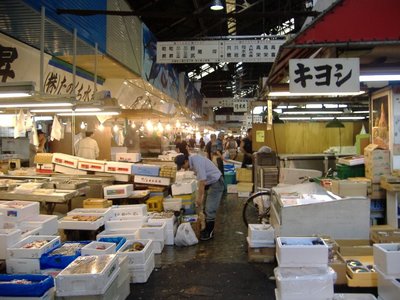Tsukiji Fish Market in Japan
Just like their ancestors a hundred years ago, Japanese love fish. Actually, they eat fish every day. However, the fact might be surprising to you, but Japan is only the fourth country after the Maldives, Iceland and Kiribati that consumes the largest quantity of fish per head.

Japanese people have a special taste in eating raw or almost raw seafood, which was initially the traditional sea delicacy known as Sashimi. That is why the gifts of sea became an important part of life in Japan. During holidays, they eat sea bream and shrimps - mind that every region has its own secrets for food preparation.
Seafood also enriched the Japanese cultural life, finding its expression in haiku poetry, paintings as well as rakugo comic stories that are so popular among simple people. Fish is an essential part of modern Japanese culture and people's life, and the special place to buy this food in Tokyo is the Tsukiji fish market. It is the food treasure house specialized in various fresh foods, including seafood as well as vegetables and meat. They say that it is the biggest world market with the largest market area, largest earnings, the number of bargains and the number of visitors. But it is fish that the market is famous for. The market is located 15 minutes walk from the Ginza street, and from the Tokyo centre as well.
Every day there are about 450 species of shellfish and simple fish weighing about 2.300 tons delivered here from all the Japanese seas. This is a really noisy place with lots of lorries and three-wheel cars called "turrets" going to and fro along the market. Every night, starting from 11 p.m. they unload great amount of fish here, almost all of which is delivered by lorries, though there are also special ships that moor to the harbour nearby. After that, the fish is divided among the seven wholesale companies who have a special agreement on how to sell the fish that was caught by the fishing companies. There is a strict rule maintained here which tells that all the fish that was brought to the market must be sold at the auction the same day. This guarantees that fishermen will get their money.
At 4.40 a.m. a bell rings and the auction workers for the wholesale companies start selling fish to the middlemen, who have about 929 shops at the market. Then, the middlemen sell their fish to the retailers. Of course, the auctioneers need the highest price for their products, and they have their own methods of how to get it. For instance, they can spread a rumor that they have something very special, or dance and move telling everyone about their product in a way they pronounce the Buddhist prayers.
The most talented of them can even dance following some charming rhythms. At the same time, buyers raise their hands when necessary, showing that they are eager to buy the product. Thus, every auction finishes in five minutes and long before the sundown, middlemen are strolling along the rows of stalls to see whether the condition of fish is still satisfactory. Some of them have been working here since 1935, when the market was opened, others got their experience piece by piece, so they perfectly know how a good fish must look like.
After that, middlemen carry the fish to their shops and prepare it for retail trade, which starts at 8 am. Every day, about 40.000 retailers come to the market to enrich their shops stores as well as restaurant stores. So, the market starts its work early in the morning, and thanks to this fuss Japanese people are offered fresh food. If you haven't tasted seafood while staying in Tokyo, then you cannot tell that you know the Japanese culture.
About the Author
by Tania Kogut, To book your room in Tokyo hotel, visit Tokyo hotels reservation
Japanese Culture and Society Links
Japanese Sports 競技 (スポーツ)
Japanese Food 食品 (しょくひん)
Japanese Pop Culture 文化(ぶんか)
- Hello Kitty Phenomena
- Japanese Anime, Japanese Manga
- Japanese Hair Straightening: All You Ever Wanted to Know
- Japanese Karaoke
- Kawaii
Miscellaneous
- Creating a Japanese Garden Theme
- Keeping and Handling Japanese Inro
- Misconception about Ninja
- Japanese Bonsai
- Japanese Geisha
- Japanese Wedding
- Why Do Japanese Have Long Lifespan?
- Decorate with Japanese Art
Japanese Literature Links
- Haiku Poetry
- Japanese Alphabet
- Japanese Language
- Japanese Pronunciation
- Learning Japanese Kanji
- Tanka Poems
Japanese Art Links